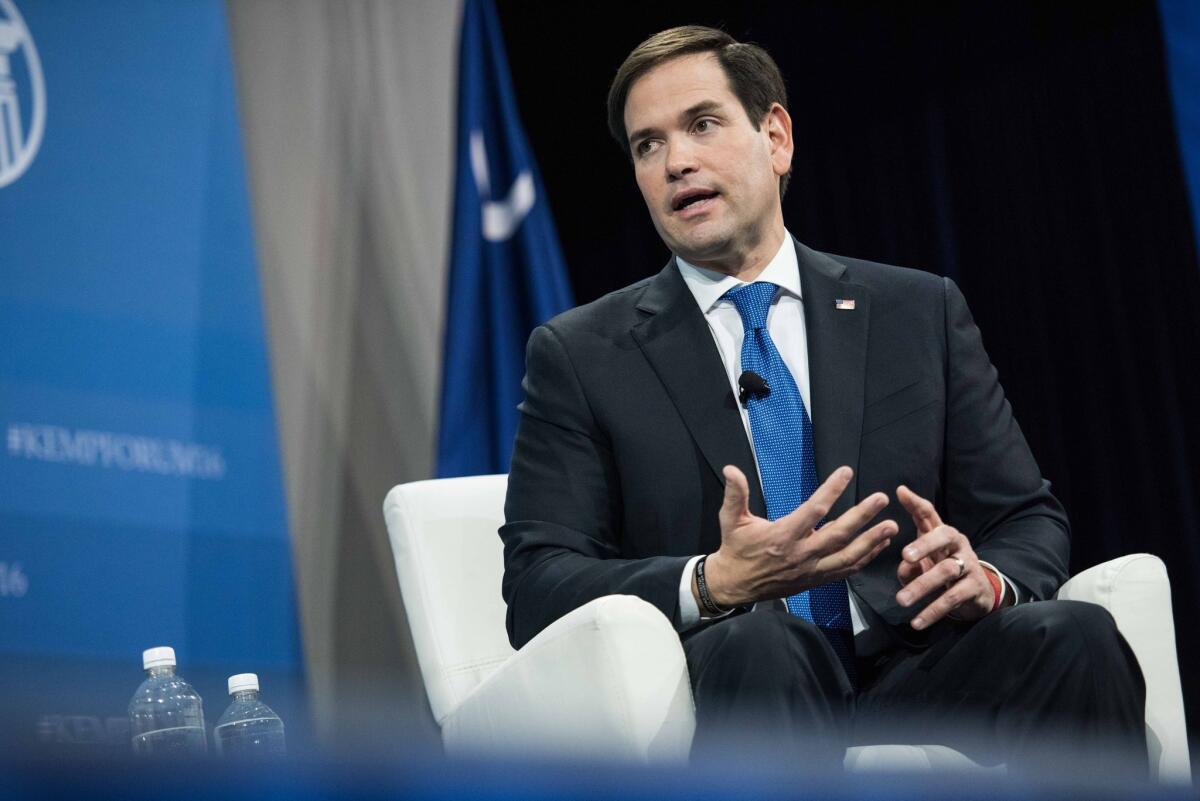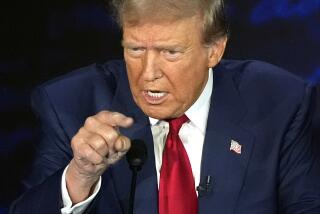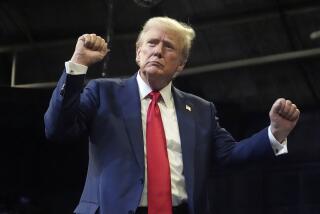Column: A race to claim the mantle of anger

Republican presidential candidate Marco Rubio speaks at an economic forum in Columbia, S.C. on Jan. 9. Rubio was interrupted multiple times by protesters angry about his immigration policy.
Early in last week’s pyrotechnic debate among Republican presidential candidates, Donald Trump was confronted with the charge that he’s made the GOP sound too angry.
His response was quick, polished and — by Trumpian standards — eloquent.
“I will gladly accept the mantle of anger,” he said. “Our military is a disaster. Our healthcare is a horror show…. Illegal immigration is beyond belief. Our country is being run by incompetent people. And yes, I am angry … because our country is a mess.”
Candidates who make anger an explicit part of their messages ... are doing well. Candidates who have tried to offer a sunnier vision ... are sinking.
There are two Republican parties right now. One is angry, pessimistic, often nativist, and winning in the polls. The other is optimistic, inclusive, reformist — and losing.
Candidates who make anger an explicit part of their messages — Trump, Ted Cruz and, increasingly, Marco Rubio — are doing well. Candidates who have tried to offer a sunnier vision — Ben Carson, John Kasich and Jeb Bush, who promised to campaign with “joy in [his] heart” — are sinking.
The angriest candidates appear to be doing the best of all. Last week, the NBC-Wall Street Journal Poll asked Republican primary voters whom they preferred in a three-way choice among Trump, Cruz and Rubio; Trump drew 40%, Cruz 31%, Rubio only 26%.
The dyspeptic mood among GOP voters isn’t a new discovery. Pollsters — and reporters at campaign rallies — have been stumbling across it for more than a year.
“Republican primary voters are angry and unhappy with the direction of the country, the leadership and performance of the Congress, and especially with President Obama,” pollster Peter D. Hart reported after talking with GOP voters in Indianapolis last year. “These people have done a better job of figuring out what they are against rather than what they are for.”
What’s new is the stampede of candidates to reflect that anger, guided partly by Trump’s example.
In terms of issues, the debate has been framed mostly around illegal immigration, fear of terrorism and trade policy. But in a brilliant essay last week in National Review, conservative writer Yuval Levin argued that voters’ anxiety has a much deeper cause: their loss of confidence in traditional politics as a way to solve the country’s problems.
“It’s a debate about how to handle the public’s collapsing faith in the establishment — that is, in our political elite and our core governing institutions,” Levin wrote. All the leading GOP candidates “describe the hollowing out and decay of America’s elite, its core institutions and its political leadership.”
Trump, he noted, derides the leaders of both parties as “stupid people.” Cruz charges that they have been co-opted by monied interests in Washington. Rubio, more restrained, merely criticizes them as “anachronistic and stuck in the past.”
The case of Rubio is instructive: He began the campaign as an optimistic reformer — but when the voters’ mood became clear, he switched sides.
Last summer, Rubio said Trump’s message wasn’t positive enough to win the presidency. “I think our nominee is going to be someone that embraces the future,” he said. He called for broadening the GOP’s appeal to minorities, and proposed “reform conservative” ideas including an expanded tax credit for the working poor.
But in recent weeks, Rubio’s rhetoric has grown darker — more like Trump’s. “As I travel the country,” he said in last week’s debate, “people say what I feel. This country is changing. It feels different. We feel like we’re being left behind and left out.”
He also toughened his position on immigration reform, again moving closer to Trump. Because of the threat from Islamic State, he said, “The entire system of legal immigration must now be reexamined for security first and foremost.”
To be fair, Rubio’s optimism hasn’t been entirely extinguished. It’s still possible to “turn this country around,” he said, “if you elect me.”
Although “reform conservatives,” who sought to remake the GOP message to focus on poverty and inclusiveness, have virtually disappeared from the campaign, they haven’t died out entirely. They still have a champion in House Speaker Paul D. Ryan (R-Wis.), who said he wants Congress to work on innovative conservative ideas — so that when the party chooses a nominee, a positive program will be ready.
“We want to be an inspiring, inclusive, majority party,” Ryan said at a conference on poverty. “We are not just an opposition party; we are a proposition party.”
And a leading conservative thinker, Arthur C. Brooks of the American Enterprise Institute, argued that broadening the party’s message was not only the right thing to do, but a political necessity.
“We know that if conservatives capture the traits that are typically associated with liberals, empathy and compassion, that fact will swing independent, persuadable voters,” he said. “That’s not something that can win; it’s the only thing that will.”
That may be wishful thinking. The GOP campaign has turned into a scramble for what Trump called the mantle of anger. And the angriest man appears to be winning.
Twitter: @doylemcmanus
Follow the Opinion section on Twitter @latimesopinion and Facebook
More to Read
A cure for the common opinion
Get thought-provoking perspectives with our weekly newsletter.
You may occasionally receive promotional content from the Los Angeles Times.











